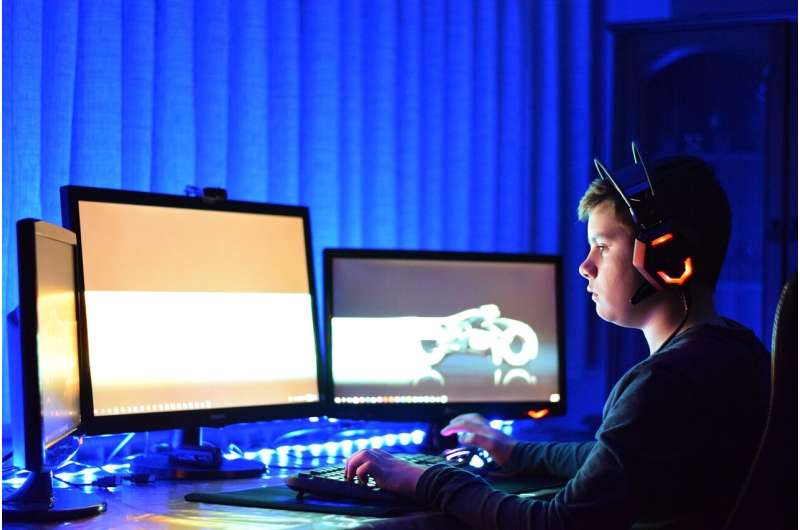
Image credit: Pixabay/CC0 Public Domain
Building positive relationships with teachers and peers in the classroom can be vital to the mental health and academic success of children and teens, but a new national survey from the Kids Mental Health Foundation, conducted by Ipsos, shows that half of parents believe too much time spent on technology and social media is holding children back from building meaningful relationships in the upcoming school year.
The survey reveals the biggest challenges children face in building relationships in the classroom. According to the survey of more than 1,000 parents in the US, the biggest challenges are:
- Too much time with technology (50%)
- Bullying (30%)
- Social impact of the pandemic (22%)
Cultural and background differences can also play a role: About one-fifth of parents (19%) say their children have difficulty socializing at school because they feel like they don’t belong because of their race, ethnicity, culture, socioeconomic status or gender identity.
“We know that connections help foster a sense of belonging, and when children feel like they belong in school, they perform better academically and lead healthier lives overall. Belonging is especially important for the adjustment and acculturation of immigrant children,” said Ariana Hoet, Ph.D., senior clinical director of the Kids Mental Health Foundation and a child psychologist at Nationwide Children’s Hospital. “Technology isn’t all good or all bad, but parents should watch for warning signs if they feel their child’s balance in using technology is affecting their social connections in the real world.”
Warning signs parents should look for to determine if their child is spending too much time on social media, gaming, or other screens include:
- Losing track of time. Check to see if your child is honest about the time they spend on devices.
- Being busy/distracted. Observe whether your child feels an urgent need to return to their devices or screens during offline activities.
- Isolate. Watch for a lack of interest in social contacts and “real life” activities.
- Irritability. Watch for signs of anger or irritability while gaming (e.g., throwing a controller, yelling, or breaking objects).
- Effects on physical health. Watch for sleep disturbances or decreases in physical activity, changes in eating habits, or an increased focus on appearance.
- Changes in offline activities. Watch for negative changes in interactions or relationships with family or friends, as well as declining academic performance.
The survey also found that children are drawn to bonding when they feel like they belong (14%), make new friends in class (17%), are bullied or excluded (13%), and make new friends through sports and extracurricular activities (5%).
“The good news is that teachers and parents can help strengthen children’s sense of belonging,” said Dr. Hoet. “However, we must remember that this can be more difficult for immigrant parents, as they may not understand the school system and culture.”
To help children from marginalized or underrepresented groups feel a stronger sense of belonging, parents, caregivers and others can:
- Find mentors who model positive behavior. Your child can benefit from connecting with family, friends, relatives, or even children a few years older. Hearing that others similar to your child have successfully navigated high school or college can give them the confidence to strengthen their sense of belonging.
- Look for environments where your child fits in. Underrepresented children may not feel connected at school, but they may enjoy clubs or cultural organizations where they have something in common with the others in the room. The more places your child experiences social connectedness, the better.
- Talk to your child. Find out how they are feeling at school or in other social settings. Make sure your child is not being bullied online or receiving negative feedback on social media, as hurtful online experiences can affect a child’s sense of belonging in the real world. Take time to help children who feel like they don’t belong.
The Kids Mental Health Foundation, founded by Nationwide Children’s, provides expert-supported content for parents, caregivers and teachers. Resources such as “Signs Your Child is Fesselts on Screens,” “Talking with Kids about Social Media,” “Why School Belonging Matters,” “Strengthening School Bonding,” and “10 Ways to Combat Bullying” can help teachers and caregivers increase protective factors around children such as school belonging and adult-child bonds, and strengthen the mental health of young students.
This Kids Mental Health Foundation/Ipsos poll was conducted by Ipsos using the probability-based KnowledgePanel from August 2-4, 2024. This poll is based on a nationally representative probability sample of 1,146 adult parents of children under 18 years of age. The poll has a margin of error of ± 3.1 percentage points in the 95% confidence interval for all respondents.
Further information:
For additional resources, visit KidsMentalHealthFoundation.org.
Offered by Nationwide Children’s Hospital
Quote: 50% of parents believe too much time on technology is keeping kids from socializing in the classroom, new survey finds (August 16, 2024) Retrieved August 16, 2024 from https://phys.org/news/2024-08-poll-parents-technology-kids-classroom.html
This document is subject to copyright. Except for the purposes of private study or research, no part of it may be reproduced without written permission. The contents are for information purposes only.

